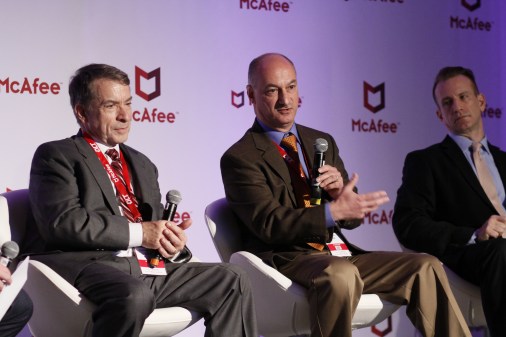
NSA Director Adm. Mike Rogers. (Credit: Intelligence and National Security Alliance)
One of the first things Adm. Mike Rogers did when he took the helm as the 17th director of the National Security Agency was ask his staff to find ways to, in his words, “create a more permeable membrane” between the private sector and the agency so stronger partnerships could be developed. Now, just six months later, it seems that membrane may have some holes that allowed a couple of senior agency officials to keep one foot in the NSA and its secrets, and the other foot in private enterprise with all of its monetary temptations.
Earlier this month the NSA was forced to launch an internal review of the practice after Reuters published a story detailing how the agency allowed Patrick Dowd, the NSA’s chief technical officer, to work 20 hours per week for IronNet Cybersecurity Inc., a private cybersecurity firm founded by former NSA Director Gen. Keith Alexander. The company reportedly charges financial institutions up to $1 million per month for cybersecurity services based on technology patents Alexander developed while he was employed as NSA director. Under pressure, Alexander terminated the agreement with Dowd last week.
While the Dowd case raised eyebrows in and out of the national security community, it is not the only case that seems to be tied to Rogers’ push for a “more permeable membrane” between NSA and industry. Last week, NSA announced Teresa Shea, the director of signals intelligence (SIGINT), was rotating out of her position to another undisclosed job. Shea has been the subject of multiple investigative reports during the past three months that revealed the head of NSA’s most powerful component had formed Telic Networks, a private company based out of her home that specializes in SIGINT and electronic intelligence (ELINT) signals processors. Shea’s husband, James Shea, is listed as the company’s president and resident agent and is also employed by DRS Signals Solutions Inc., a SIGINT contractor.
Rogers downplayed the appearance of a conflict of interest in these cases and the potential for such arrangements to put classified government information at risk during a question-and-answer session Tuesday at the U.S. Chamber of Commerce in Washington, D.C.
“We have a formal set of processes that must be applied when individuals are going to do something in addition to their NSA duties,” Rogers said. “We review that consistently over time and when circumstances change what was acceptable at one point, we’ll say, ‘Hey, that’s not acceptable anymore, the circumstances have changed the nature of the relationship between the outside entity and us.’ In terms of the flow of partnerships and information back and forth, I have been very public about saying for the National Security Agency, I would like us to create a model where members of our workforce don’t necessarily spend 30 or 35 years working directly for us, which right now has been the historic norm.”
But that doesn’t seem to be exactly what happened in the case of Dowd and Shea. Both Dowd and Shea likely reported directly to NSA’s Deputy Director Rick Ledgett, who as the senior civilian leader of the agency acts as NSA’s chief operating officer. And while NSA would not comment on whether Dowd or Shea received permission for their private business activities, a spokesperson told FedScoop in every case, employees must seek out and receive approval from their supervisors.
“Individual employees are obligated to seek and obtain approval from their supervisor when required,” NSA spokesperson Vanee Vines said. In addition, Vines said NSA’s ethics officials provide advice on conflicts of interest analysis.
As for Shea’s reported job change, Vines said it is in no way related to press reports that allege a conflict of interest. “NSA considers regular rotations of senior leaders as a catalyst for achieving diverse, fresh perspectives on the nation’s critical national security challenges. The pending transition of a director of signals intelligence was planned well before recent new articles,” she said.
“Given the state of technology, we’ve got to create a world where people from NSA can leave us for a while and go work in the private sector,” Rogers said. “And I would also like to create a world where the private sector can come spend a little time with us. Because one of the challenges as a nation that I think we’re dealing with, and you’ve seen this play out over the last year or so, we talk past each other a lot because we don’t understand each other. And I’d like to see what we can do to try to change that. It will produce better outcomes for both of us, and it will serve us better as a nation.”
In a statement emailed to FedScoop, the NSA said the agency takes federal ethics laws seriously and has established a formal program around financial disclosures for employees. All NSA employees file a financial disclosure report called an Office of Government Ethics form 278, which is reviewed by their immediate supervisor. If the supervisor finds a potential conflict of interest, he or she is supposed to make a note in the report and refer it to an ethics counselor. The ethics counselor conducts an independent review and compares the employee’s holdings and financial interests with a list of NSA contractors.
“If the employee has financial interests in an agency contractor, the ethics counselor reviews the relevant agency documentation to see if the contracts are for support to the employee’s organization,” the NSA statement said. “If so, a dialogue with the employee’s supervisor occurs in order to determine if the employee has duties that could affect his/her financial interests. When a possible or actual conflict is found, the agency and employee agree upon a suitable remedy.”







